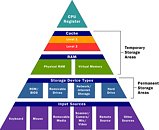Wednesday, August 15th 2018

New "L1 Terminal Fault" Security Vulnerability Affects Intel Processors, Mitigation Out
A new series of CPU vulnerabilities affecting Intel processors emerged from the company's security bounty-hunter program, which are an exploitation of the L1 terminal fault. The vulnerability affects Intel processors that support SGX (Software Guard Extensions). A multinational group of researchers from KU Leuven University, Technion - Israel Institute of Technology, University of Michigan, University of Adelaide and Data61 chronicled the vulnerability. The exploit involves interpreting and deriving data from timing the L1 cache. You'll recall that NetSpectre was a similar timing-based bit derivation exploit, what's being measured here instead, is how the L1 cache SRAM refreshes itself to different patterns of bits, and transcribing them to bits and bytes on the other end. We imagine a mitigation to this bug would be to randomize the L1$ timers.
Intel these days is releasing CPU microcode updates faster than King updates Candy Crush with new offline banner ads. The company was sure to have a mitigation for this vulnerability ready before disclosing it to the public. The company, in a statement, said that it's working tireless to get customers to install the updates. The three variants of the L1 Timing Fault vulnerability are chronicled in CVE-2018-3615, CVE-2018-3620, and CVE-2018-3646.Intel's briefs for each of the three vulnerabilities follows:
Intel these days is releasing CPU microcode updates faster than King updates Candy Crush with new offline banner ads. The company was sure to have a mitigation for this vulnerability ready before disclosing it to the public. The company, in a statement, said that it's working tireless to get customers to install the updates. The three variants of the L1 Timing Fault vulnerability are chronicled in CVE-2018-3615, CVE-2018-3620, and CVE-2018-3646.Intel's briefs for each of the three vulnerabilities follows:
- L1 Terminal Fault-SGX (CVE-2018-3615)-Systems with microprocessors utilizing speculative execution and Intel SGX may allow unauthorized disclosure of information residing in the L1 data cache from an enclave to an attacker with local user access via side-channel analysis.
- L1 Terminal Fault-OS/ SMM (CVE-2018-3620)-Systems with microprocessors utilizing speculative execution and address translations may allow unauthorized disclosure of information residing in the L1 data cache to an attacker with local user access via a terminal page fault and side-channel analysis.
- L1 Terminal Fault-VMM (CVE-2018-3646)-Systems with microprocessors utilizing speculative execution and address translations may allow unauthorized disclosure of information residing in the L1 data cache to an attacker with local user access with guest OS privilege via a terminal page fault and side-channel analysis

48 Comments on New "L1 Terminal Fault" Security Vulnerability Affects Intel Processors, Mitigation Out
No cache security, allowing for faster and more precise timing, at the expense of security. I would speculate but the time all the security is in place, or what could be in place to make it as secure as competing products IPC will be within 2-3% of each other.
The link i gave in the previous reply was of a user (moderator, even) @ Anandtech, but fair enough: here's a link for you:
www.pcworld.com/article/3250645/laptop-computers/how-meltdown-and-spectre-patches-drag-down-older-hardware.html --- notice the date: what do you think will happen with all the other mitigations since that date on top?
and a more technical explanation
Both of these videos come from here: www.redhat.com/en/blog/understanding-l1-terminal-fault-aka-foreshadow-what-you-need-know
EDIT
@ worse case scenario, one will need to shut down HT: how much performance does that cost? 20%? More? This is for just this particular security issue!
I've seen somewhere that meltdown / spectre affect greatly both registry manipulations as well as storage access but unfortunately, i'm not finding where i read that :(
Lastly, can you trust Intel that they'll optimize these patches with OS vendors so that the performance impact is minimal on existing servers. I mean they are in the business of selling servers after all, the cynic in me says that they likely won't and would rather sell you a brand new chip.
Furthermore, there's no guarantee that there won't be found any more spectre like variants to which AMD's chips end up being susceptible to, which means all the more reason to fix these @ a hardware level then @ software level.
Intel has it worse because it's affected by spectre and meltdown like attacks, which means they definitely need to fix this @ a hardware level.
EDIT (these were originally two different posts but auto-merge "begged to differ")
Well: it seems worse then 1st thought.Full info here:
www.itwire.com/security/84056-openbsd-chief-says-more-intel-cpu-flaws-likely-to-be-found.html
marc.info/?l=openbsd-tech&m=153504937925732&w=2
This should really be thoroughly investigated and, if any neglect were to be found, Intel should really be punished for it.
Intel and AMD both say "We might have bugs. Help us find them, and we'll pay you", yet suddenly when a bug is found, these guys are culpable? That's quite an interesting thought. I guess you never read the paper that comes in your CPU boxes?
I'm sure this OpenBSD dude knows more about these security issues then all the "regular forum members" combined, which is why his views on this matter carry a heck of a lot more weight.
The idea that threads on separate cores share cache, and thereby that cache may be vulnerable, isn't a new idea, either. That in and of itself is how these are related to Spectre/Meltdown, but there's still far more to yet be disclosed.